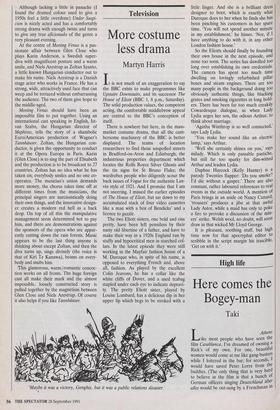Television
More costume less drama
Martyn Harris
It is not much of an exaggeration to say the BBC exists to make programmes like Upstairs Downstairs, and its successor The House of Eliott (BBC 1, 8 p.m., Saturday). The solid production values, the competent acting, the comfortable middlebrow appeal are central to the BBC's conception of itself.
There is nowhere but here, in the mass- market costume drama, that all the cum- bersome machinery of the BBC is better displayed. The teams of location researchers to find those unspoiled streets in Bradford-on-Avon and Edinburgh; the industrious properties department which locates the Rolls Royce Silver Ghosts and the tin signs for St Bruno Flake; the wardrobes people who diligently scour the back issues of Vogue for the authentic Lan- vin style of 1921. And I promise that I am not sneering. I missed the earlier episodes of The House of Eliott, but sat down to my accumulated stack of four video cassettes like a man with a box of Bendicks' and a licence to guzzle.
The two Eliott sisters, one bold and one pretty, have been left penniless by their nasty old libertine of a father, and have to make their way in a 1920s England run by stuffy and hypocritical men in starched col- lars. In the latest episode they were still working in the Mayfair fashion house of a M. Duroque who, in spite of his name, is opposed to everything French and, above all, fashion. As played by the excellent Colin Jeavons, he has a collar like the white cliffs of Dover, and a used teabag stapled under each eye to indicate depravi- ty. The pretty Eliott sister, played by Louise Lombard, has a delicious dip in her upper lip which begs to be stroked with a little finger. And she is a brilliant dress designer to boot, which is exactly what Duroque does to her when he finds she has been pinching his customers in her spare time. 'You will not spend another minute in my establishment,' he hisses. 'Nor, if I have anything to do with it, in any other London fashion house.'
So the Eliotts should finally be founding their own house in the next episode, and none too soon. The series has dawdled too long over establishing its own credentials. The camera has spent too much time dwelling on lovingly refurbished pillar boxes and steam engines. There are too many people in the background doing too obviously authentic things, like blacking grates and smoking cigarettes in long hold- ers. There has been far too much creakily Cowardesque dialogue, as when Lady Lydia urges her son, the odious Arthur, to think about marriage.
`Agatha Winthrop is so well connected,' says Lady Lydia.
`You make her sound like an electric lamp,' says Arthur. `Well she certainly shines on you,' says milady. Which is only passable pastiche, but still far too sparky for dim-witted Arthur and leaden Lydia.
Daphne Haycock (Kelly Hunter) is a parody Twenties flapper: 'Do you smoke? I'd die without a gasper.' There are also constant, rather laboured references to real events in the outside world. A mention of Paris brings in an aside on Nancy Cunard; `trousers' produces a jibe at that awful Lady Astor, while a maid has only to poke a fire to provoke a discussion of the min- ers' strike. Welsh wool, no doubt, will soon draw in that wicked Mr Lloyd George.
It is pleasant, soothing stuff, but high time now for that apocryphal editor to scribble in the script margin his irascible, `Get on with it.'


































































 Previous page
Previous page